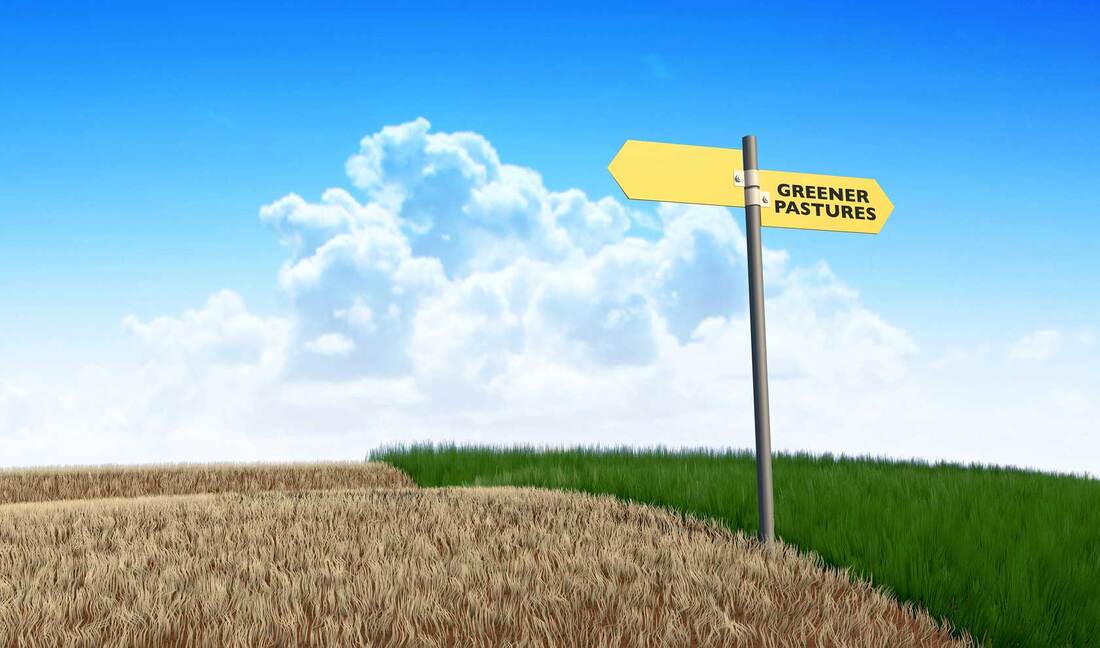|
We’ve all experienced the “grass is greener” syndrome. Well, I don’t know if everyone experiences the feeling—some people might think their situation is the best in the entire universe. Basically, the expression refers to the idea that there is something better that we are missing. I experience this often. When I go fishing, for example. I always think carefully about where I want to fish, weighing the options in my mind. Then, when I get to the spot I decided on, I start to wonder if I made the wrong choice: “I am at location A, but would I be catching more fish if I’d gone to location B? Yes, I’m pretty sure I would. Why-oh-why did I chose location A? I’m such an idiot!”
This is a minor example, with little to no consequences. Unfortunately, though, some people have “grass is greener” syndrome with regards to really important aspects of their lives. To solve this mystery, first we should figure out where the expression (an idiom, actually) came from. I used to think it came from the fact that cows and sheep are often seen stretching their necks through the fence to eat the grass on the other side. As it turns out, though, it probably came from a really old Latin proverb that was translated into English in 1545: The corne in an other mans ground semeth euer more fertyll and plentifull then doth oure own. If you haven’t guessed, the more modern translation is: The corn in another man’s ground seems ever more fertile and plentiful than our own. Hmm… maybe we should consider why grass is green in the first place. That way we can get some biology into this mystery. Basically, the color has to do with the pigment called chlorophyll. Most plants have little organelles called chloroplasts inside their cells. These chloroplasts contain molecules of chlorophyll. Chlorophyll molecules absorb certain wavelengths of light, especially red and blue. Green light, on the other hand, is reflected. That reflected green light hits the retinas of your eyes when you look at grass, which is why you perceive grass to be green in color. Now let's get to the question of why people (me included) sometimes have a tendency to believe the grass is greener on the other side. First, it's worth noting that sometimes the grass really is greener on the other side. For example, if someone is in a job they hate, or in an abusive relationship. In cases like that, the “grass is greener” syndrome is actually a healthy thing. However, why is the syndrome so common when we actually have no evidence that the alternative situation is any better than the situation we are in? I don’t really have any evidence that the other fishing spot would be any better on this particular day. So, why do I experience the “grass is greener” syndrome? Psychologists say it is based on fantasy and fear. The fear is easy to explain. Many people have a fear of boredom, or wasting time, or being unproductive, or missing out. And on the more serious side, a fear of being trapped by commitment, fear of losing one’s individuality, or fear of oppression. Where does the fantasy part come in? We tend to convince ourselves that, if we go to the greener side, we will get exactly what we want. That’s a fantasy because we have no evidence that we will get anything better than what we currently have. There is a new variation of the phrase, and I have decided to embrace it: “the grass is greener where you water it.” In other words, good situations come from the energy you put into them, not from dreaming about them.
0 Comments
Leave a Reply. |
Stan's Cogitations
Everyone needs a creative outlet. That's why I write. Archives
July 2024
|


 RSS Feed
RSS Feed